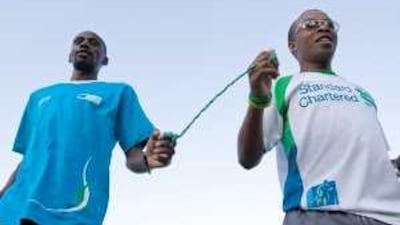DUBAI // Running a distance race is not easy in the best of conditions. Doing so in complete darkness and with someone tied to your wrist is a feat very few could achieve. Yet that is what Henry Wanyoike has done successfully for more than a decade and he has two Paralympics gold medals plus a few world records to prove it.
The 35-year-old Kenyan, who lost his sight 15 years ago, will be in the starting line tomorrow to compete in a 10km race, part of the Dubai Marathon, for the second time, with his guide, running partner and childhood friend Joseph Kibunja. The last time they both ran the race three years ago, they came second overall in 33 minutes 34 seconds. Mr Wanyoike is hoping for another strong showing, even though they are still feeling the effects of a recent race. "We are aiming to finish the Dubai race in 35 to 38 minutes," he said after touching down in the emirate on Tuesday. "Our best 10km time is 31 minutes on the track, but after a very close competition in Mumbai, running the half marathon last Sunday, it has given us only one week to recover."
Mr Wanyoike and Mr Kibunja were met by a small crowd of fans at Dubai International Airport, all wanting the autograph and photograph of a man who has achieved his childhood dream against all the odds and is now running to help make the dreams of others possible. Both men have been goodwill ambassadors for the London-based bank Standard Chartered and have run in all 10 races the bank sponsors each year since 2004. These include at least three half marathons and a full marathon for the Seeing Is Believing campaign. The campaign has raised US$17 million (Dh62m) and aims to provide sight-saving eye care to 20 million people by 2014.
Mr Wanyoike is running in the footsteps of national heroes in Kenya, which has produced some of the world's best-known track athletes. They include the two-time Olympic gold medallist Kipchoge Keino and Nancy Lagat, who won the women's 1500 metre race at the 2008 Beijing Games. Of the nation's 75 Olympic medals, 68 have been won in running events. "Before I lost my sight I was good at sports, particularly 5,000-metre races," says Mr Wanyoike, who has a six-year-old son. "It was my dream, in fact, when I was young, to be in the world of sport. In Kenya we produce a lot of runners and I was admiring that kind of life. I used to run the five kilometres to school every day. I loved running."
Mr Wanyoike, who grew up in a slum area 20km from Nairobi, excelled in athletics throughout primary and secondary school. He earned the money to travel to national running competitions by using his skill at trapping moles for farmers and later digging animal latrines. In March 1995, aged 21, he suffered a stroke which left him paralysed down one side. He regained his physical strength but his optic nerves suffered irreparable damage and on May 1 of that year he woke up unable to see.
"I never saw the world with my eyes again," he says. "It was a very painful, very frustrating time. I come from a very happy family but not a well-off family. My mother didn't know what to do with me. It took me about three years to accept my life." He reluctantly agreed to attend rehabilitation sessions in 1999 and met others who had lost their sight through accident, illness and diseases such as diabetes.
He resurrected his dream of being a champion runner and became determined to inspire others and raise money for those suffering from preventable blindness. "It was difficult to run in the beginning," he says. "I have scars all over my hands from the falls I had. It is not easy to find a good guide." After working with several guides, Mr Wanyoike paired up with Mr Kibunja and they have been inseparable ever since. They run tied together at the wrist with a small rope, with Mr Kibunja on the outside.
"I push using my elbow when we need to turn a bend and I am always talking, telling him of what is coming up," he said . Their motivation gives others hope and shows there is a way forward for those afflicted with a disability."It is about providing eye care to those who need it, cataract operations for example," Mr Wanyoike says. "It is about treating preventive blindness. Eighty per cent of blindness in the world is preventable. Forty-five million people have lost their sight. We need to reduce the numbers."
He and Mr Kibunja, who will return to Nairobi on Saturday, regularly speak at schools and offices around the world to spread their message. They were scheduled to address pupils at Jumeirah College yesterday and the Royal Dubai School today. "They need to see champions, they need to see that they can make it in life and that sport is a means to prevent blindness," says Mr Wanyoike, who is keen to promote exercise as a preventive measure against diabetes, which can lead to degenerative eye conditions.
"This was always my dream and I was happy to achieve all of this without my vision, but I have not yet achieved everything. "I want to reach that target of 20 million people, maybe even continue beyond it. I always say I lost my sight, but I never lost my vision." @Email:loatway@thenational.ae

